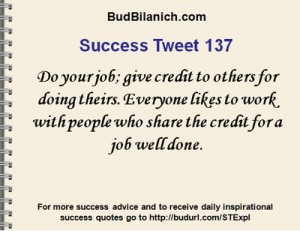 As I was searching the net for some inspiration on what to write about in this tweet, I came across a piece by Susan Heathfield on About.com called, Play Well With Others at Work. Successful, interpersonally competent people are able to build strong relationships with the people with whom they work – this involves both working and playing well with others at work. Here is an edited version of what Ms. Heathfield has to say about playing well with others at work.
As I was searching the net for some inspiration on what to write about in this tweet, I came across a piece by Susan Heathfield on About.com called, Play Well With Others at Work. Successful, interpersonally competent people are able to build strong relationships with the people with whom they work – this involves both working and playing well with others at work. Here is an edited version of what Ms. Heathfield has to say about playing well with others at work.
These are the top seven ways you can play well with others at work. They form the basis for effective work relationships. These are the actions you want to take to create a positive, empowering, motivational work environment for people
- Suggest solutions to the problems you identify and raise. Identifying problems is easy. People who provide thoughtful solutions to the problems and challenges they raise earn the respect and admiration of their coworkers and bosses.
- Don’t ever play the blame game. You alienate everyone around you. Yes, you may need to identify who was involved in a problem. You may even ask the Deming question: what about the work system caused this failure? But, not taking responsibility for problems you create and publicly identifying and blaming others for failures creates enemies. These enemies will, in turn, help you to fail. Interpersonally competent people realize that they need allies at work.
- What you say and what you do matters. When you talk down to someone, use sarcasm, or sound nasty, other people are likely to hear you. We are all radar machines that constantly scope out our environment. In one organization a high level manager said to me, “I know you don’t think I should scream at my employees. But, sometimes, they make me so mad. When is it appropriate for me to scream at the employees?” Answer? Never. This goes for people who aren’t in leadership positions too. It’s never appropriate to raise your voice to a colleague or coworker.
- Never blind side people. Interpersonally competent people keep their colleagues in the loop. They discuss problems with the people directly involved before discussing them with others. Interpersonally competent people do not ambush others. They know that if they do, they will never build effective work alliances. And without alliances, you never accomplish the most important goals.
- Keep your commitments. When you fail to meet deadlines and commitments, you affect the work of other people. Always keep commitments, and if you can’t, make sure the affected people know what happened. Provide a new due date and honor the new deadline.
- Share credit for accomplishments, ideas, and contributions. It’s very rare to accomplish a goal or complete a project with no help from others. Take the time, and expend the energy, to thank, reward, recognize and specify contributions of the people who help you succeed. This is a no-fail approach to building effective work relationships.
- Help other people find their greatness. Every person has talents, skills, and experience. If you help people harness their best abilities, you benefit them and your organization immeasurably. Personal growth and development benefits everybody. Compliment, recognize, praise, and notice contributions. You don’t have to be a manager to help create a positive, motivating environment.
If you carry out these seven actions regularly – especially number 6, “Share credit for accomplishments, ideas and contributions,” you will become known as someone who plays well with others. And, you’ll develop effective work relationships. You’ll become interpersonally competent. Colleagues will value you. Bosses will believe you are a team player. You’ll accomplish your work goals, and you may even experience fun, recognition, and personal motivation. Work can’t get any better than that.
The common sense career success coach advice here is simple. Successful people follow the career advice in Tweet 137 in Success Tweets. “Do your job; give credit to others for doing theirs. Everyone likes to work with people who share the credit for a job well done.” Pay attention to Susan Heathfield’s advice when she says, “Share credit for accomplishments, ideas, and contributions. It’s very rare to accomplish a goal or complete a project with no help from others. Take the time, and expend the energy, to thank, reward, recognize and specify contributions of the people who help you succeed. This is a no-fail approach to building effective work relationships.” If you follow this career advice, you’ll be on your way to not only building strong work relationships, but to the life and career success you deserve.

Speak Your Mind